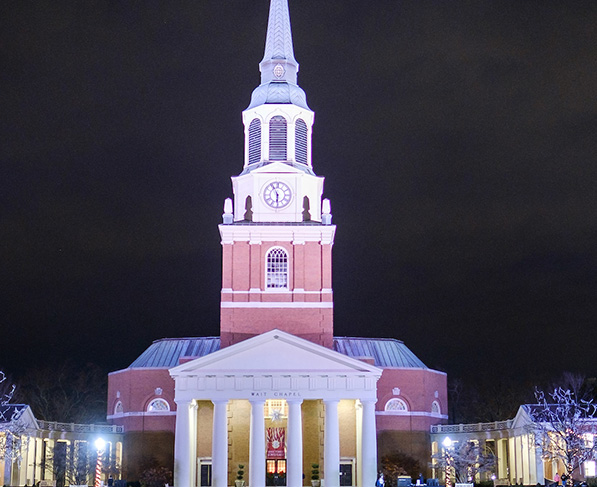Sleep anyone? Wake holding campus-wide challenge
 It’s no secret many people don’t get enough sleep, particularly college students. They sometimes stay up late studying, writing papers, reading textbook chapters – or hanging out.
It’s no secret many people don’t get enough sleep, particularly college students. They sometimes stay up late studying, writing papers, reading textbook chapters – or hanging out.
It’s also no secret proper sleep is important for everyone. So Wake Forest University’s Office of Wellbeing is offering a free, two-week Sleepin’ Deacon Challenge for students, staff and faculty that provides educational and community support to increase sleep hygiene.
Registration for Sleepin’ Deacon ends tomorrow, on Friday, Feb. 11. Today at 5 p.m., a virtual orientation session will be held. Anyone who can’t attend today’s virtual session but wants to participate in Sleepin’ Deacon should still register here. A recording of the orientation session will be emailed.
“I think the biggest benefit of Sleepin’ Deacon is the educational component of learning what healthy sleep is versus non-healthy sleep,” said Wake Forest senior psychology major Cele Daly of Atlanta. “This will be my fourth year participating in the Sleepin’ Deacon Challenge. I think it’s cool because it’s designed for you to learn about healthy sleeping by reflecting on your own habits and what you’re doing that’s unhealthy.”
Proper sleep, generally eight or more hours per night, is important for several reasons, including:
- Less than seven hours of sleep is correlated with high levels of fatigue, depression and anxiety the following day
- Our bodies restore and repair muscle tissue while we sleep
- Our brain removes toxins, that build up throughout the day, as we sleep
- And sleep deprivation is correlated with lower GPAs among college students
Marian Trattner, assistant director of wellbeing and health promotion, said Wake Forest has been doing the Sleepin’ Deacon Challenge since 2016.
“Improper sleep has been, even prior to COVID, a public health problem in that college students do not get enough recommended sleep every night,” Trattner said. “We also know, according to the Sleep Foundation and the Centers for Disease Control and Prevention, that only 32% of Americans follow the recommended sleep guidelines which say if you’re between 18-60, you should get at least seven hours of sleep per night, if you’re 61-64 you should get 7-9 hours and if you’re 65 or older, you should get 7-8 hours.”
Research also suggests people shouldn’t use cell phones or watch any kind of screen – including laptops, iPads or Kindles – an hour before bedtime.
“My understanding is that the blue light in the phones can affect melatonin in the sleep cycle, and people just aren’t aware of that,” said Dr. Guy Palmes, a staff psychiatrist at Wake Forest Student Health Service. “Sleepin’ Deacon is important because sometimes college students will stay up late then get up early and that disrupts their circadian rhythm, a daily rhythm we all have.”
Palmes said people should try to develop sleep routines, adding it’s best to try to fall asleep at the same time every night.
Trattner said the Sleepin’ Deacon Challenge requires participants to spend a little time journaling about their sleeping habits. Daly said the journal has been helpful to her.
“You don’t necessarily have to journal in the sense that you’re writing paragraphs about your sleep the night before,” said Daly, a peer educator in the Office of Wellbeing. “It’s more checking boxes and rating your quality of sleep in terms of hours, deepness of sleep, did you awake during the night, etc.”
Categories: University Announcements
